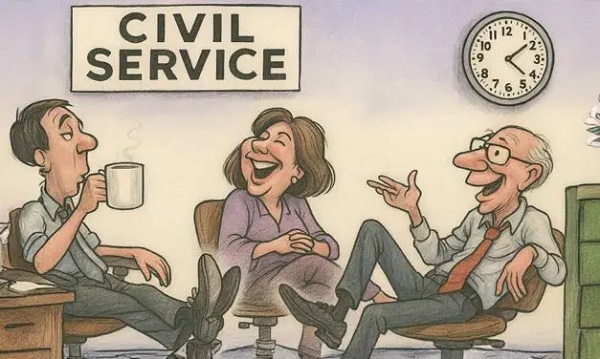Business
Ottawa’s civil service needs a Chrétien-style reset

This article supplied by Troy Media.
If Carney followed Chrétien’s lead, he could cut 64,000 jobs and save $10 billion a year
They say bureaucracy grows to meet the needs of the expanding bureaucracy. That certainly seems to be Ottawa’s motto these days, with the number of federal civil servants swelling by more than 100,000 over the past decade.
As the bureaucracy grew, so did the resources it devoured and the burden it dumped on the federal budget. If the Carney government is serious about tackling its spending problem, it has no choice but to shrink the civil service. To its credit, the government has already signalled this may be coming, with Finance Minister François-Philippe Champagne directing ministries earlier this month to cut program spending by 7.5 per cent in 2026-27, with deeper cuts to follow.
Payroll tells the story. When Justin Trudeau came to power in 2015, Ottawa was spending about $39.6 billion on employee compensation. Last year, that figure hit $71.1 billion—a staggering 79.5 per cent jump in nine years. Numbers that big are hard to picture, so here’s what they mean: $71.1 billion equals roughly $1,700 per Canadian, or about $7,000 for a family of four.
That’s a lot of money. Given those costs, Canadians are right to ask whether they’re getting anything close to value. The answer, judging by opinion surveys, is no.
Passport lines still snake around the block. Clearing customs at the airport remains a test of endurance. And if you dare call the Canada Revenue Agency, pack a lunch, you’ll be on hold long enough to need it. For all the extra spending, everyday frustrations remain the same.
If all that spending hasn’t delivered better results, it’s a flashing neon sign that resources are being wasted. The civil service is a prime candidate for cuts that could be made with little, if any, impact on the quality or speed of services Canadians actually receive.
The average compensation for a full-time federal job is now around $150,000 a year. That includes salary, taxpayer-funded pension contributions, and a generous menu of benefits. By contrast, the average Canadian earns about $60,000—the same taxpayer footing the bill— and the inequity speaks for itself.
The problem isn’t just the cost but the culture. In the private sector, businesses constantly ask whether jobs are necessary and whether people can be redeployed. In government, the tendency is to keep hiring, with little scrutiny of whether those positions are truly needed.
Yet there is precedent for Ottawa getting serious about reform. In the 1990s, Jean Chrétien’s government undertook a sweeping review that eliminated more than 17 per cent of federal positions.
If the Carney government followed that model, it could trim about 64,000 taxpayer-funded jobs and save at least $10 billion a year.
With Ottawa projected to run a deficit of over $40 billion this year, one of the largest structural deficits outside of the pandemic years, Canadians should expect—no, demand—an equally ambitious review.
Renaud Brossard is vice-president of communications at the Montreal Economic Institute, a think tank with offices in Montreal, Ottawa and Calgary.
Troy Media empowers Canadian community news outlets by providing independent, insightful analysis and commentary. Our mission is to support local media in helping Canadians stay informed and engaged by delivering reliable content that strengthens community connections and deepens understanding across the country.
Business
Will Paramount turn the tide of legacy media and entertainment?


From the Daily Caller News Foundation
The recent leadership changes at Paramount Skydance suggest that the company may finally be ready to correct course after years of ideological drift, cultural activism posing as programming, and a pattern of self-inflicted financial and reputational damage.
Nowhere was this problem more visible than at CBS News, which for years operated as one of the most partisan and combative news organizations. Let’s be honest, CBS was the worst of an already left biased industry that stopped at nothing to censor conservatives. The network seemed committed to the idea that its viewers needed to be guided, corrected, or morally shaped by its editorial decisions.
This culminated in the CBS and 60 Minutes segment with Kamala Harris that was so heavily manipulated and so structurally misleading that it triggered widespread backlash and ultimately forced Paramount to settle a $16 million dispute with Donald Trump. That was not merely a legal or contractual problem. It was an institutional failure that demonstrated the degree to which political advocacy had overtaken journalistic integrity.
Dear Readers:
As a nonprofit, we are dependent on the generosity of our readers.
Please consider making a small donation of any amount here.
Thank you!
For many longtime viewers across the political spectrum, that episode represented a clear breaking point. It became impossible to argue that CBS News was simply leaning left. It was operating with a mission orientation that prioritized shaping narratives rather than reporting truth. As a result, trust collapsed. Many of us who once had long-term professional, commercial, or intellectual ties to Paramount and CBS walked away.
David Ellison’s acquisition of Paramount marks the most consequential change to the studio’s identity in a generation. Ellison is not anchored to the old Hollywood ecosystem where cultural signaling and activist messaging were considered more important than story, audience appeal, or shareholder value.
His professional history in film and strategic business management suggests an approach grounded in commercial performance, audience trust, and brand rebuilding rather than ideological identity. That shift matters because Paramount has spent years creating content and news coverage that seemed designed to provoke or instruct viewers rather than entertain or inform them. It was an approach that drained goodwill, eroded market share, and drove entire segments of the viewing public elsewhere.
The appointment of Bari Weiss as the new chief editor of CBS News is so significant. Weiss has built her reputation on rejecting ideological conformity imposed from either side. She has consistently spoken out against antisemitism and the moral disorientation that emerges when institutions prioritize political messaging over honesty.
Her brand centers on the belief that journalism should clarify rather than obscure. During President Trump’s recent 60 Minutes interview, he praised Weiss as a “great person” and credited her with helping restore integrity and editorial seriousness inside CBS. That moment signaled something important. Paramount is no longer simply rearranging executives. It is rethinking identity.
The appointment of Makan Delrahim as Chief Legal Officer was an early indicator. Delrahim’s background at the Department of Justice, where he led antitrust enforcement, signals seriousness about governance, compliance, and restoring institutional discipline.
But the deeper and more meaningful shift is occurring at the ownership and editorial levels, where the most politically charged parts of Paramount’s portfolio may finally be shedding the habits that alienated millions of viewers.The transformation will not be immediate. Institutions develop habits, internal cultures, and incentive structures that resist correction. There will be internal opposition, particularly from staff and producers who benefited from the ideological culture that defined CBS News in recent years.
There will be critics in Hollywood who see any shift toward balance as a threat to their influence. And there will be outside voices who will insist that any move away from their preferred political posture is regression.
But genuine reform never begins with instant consensus. It begins with leadership willing to be clear about the mission.
Paramount has the opportunity to reclaim what once made it extraordinary. Not as a symbol. Not as a message distribution vehicle. But as a studio that understands that good storytelling and credible reporting are not partisan aims. They are universal aims. Entertainment succeeds when it connects with audiences rather than instructing them. Journalism succeeds when it pursues truth rather than victory.
In an era when audiences have more viewing choices than at any time in history, trust is an economic asset. Viewers are sophisticated. They recognize when they are being lectured rather than engaged. They know when editorial goals are political rather than informational. And they are willing to reward any institution that treats them with respect.
There is now reason to believe Paramount understands this. The leadership is changing. The tone is changing. The incentives are being reassessed.
It is not the final outcome. But it is a real beginning. As the great Winston Churchill once said; “Now this is not the end. It is not even the beginning of the end. But it is, perhaps, the end of the beginning”.
For the first time in a long time, the door to cultural realignment in legacy media is open. And Paramount is standing at the threshold and has the capability to become a market leader once again. If Paramount acts, the industry will follow.
Bill Flaig and Tom Carter are the Co-Founders of The American Conservatives Values ETF, Ticker Symbol ACVF traded on the New York Stock Exchange. Ticker Symbol ACVF
Learn more at www.InvestConservative.com
Business
Parliamentary Budget Officer begs Carney to cut back on spending

PBO slices through Carney’s creative accounting
The Canadian Taxpayers Federation is calling on Prime Minister Mark Carney to cut spending following today’s bombshell Parliamentary Budget Officer report that criticizes the government’s definition of capital spending and promise to balance the operating budget.
“The reality is that Carney is continuing on a course of unaffordable borrowing and the PBO report shows government messaging about ‘balancing the operating budget’ is not credible,” said Franco Terrazzano, CTF Federal Director. “Carney is using creative accounting to hide the spiralling debt.”
Carney’s Budget 2025 splits the budget into operating and capital spending and promises to balance the operating budget by 2028-29.
However, today’s PBO budget report states that Carney’s definition of capital spending is “overly expansive.” Without using that “overly expansive” definition of capital spending, the government would run an $18 billion operating deficit in 2028-29, according to the PBO.
“Based on our definition, capital investments would total $217.3 billion over 2024-25 to 2029-30, which is approximately 30 per cent ($94 billion) lower compared to Budget 2025,” according to the PBO. “Moreover, based on our definition, the operating balance in Budget 2025 would remain in a deficit position over 2024-25 to 2029-30.”
The PBO states that the Carney government is using “a definition of capital investment that expands beyond the current treatment in the Public Accounts and international practice.” The report specifically points out that “by including corporate income tax expenditures, investment tax credits and operating (production) subsidies, the framework blends policy measures with capital formation.”
The federal government plans to borrow about $80 billion this year, according to Budget 2025. Carney has no plan stop borrowing money and balance the budget. Debt interest charges will cost taxpayers $55.6 billion this year, which is more than the federal government will send to the provinces in health transfers ($54.7 billion) or collect through the GST ($54.4 billion).
“Carney isn’t balancing anything when he borrows tens of billions of dollars every year,” Terrazzano said. “Instead of applying creative accounting to the budget numbers, Carney needs to cut spending and debt.”
-

 Frontier Centre for Public Policy2 days ago
Frontier Centre for Public Policy2 days agoRichmond Mayor Warns Property Owners That The Cowichan Case Puts Their Titles At Risk
-

 Business2 days ago
Business2 days agoSluggish homebuilding will have far-reaching effects on Canada’s economy
-

 Business2 days ago
Business2 days agoMark Carney Seeks to Replace Fiscal Watchdog with Loyal Lapdog
-

 Business14 hours ago
Business14 hours agoParliamentary Budget Officer begs Carney to cut back on spending
-

 International1 day ago
International1 day agoBondi and Patel deliver explosive “Clinton Corruption Files” to Congress
-

 International1 day ago
International1 day agoUS announces Operation Southern Spear, targeting narco-terrorists
-

 Censorship Industrial Complex1 day ago
Censorship Industrial Complex1 day agoEU’s “Democracy Shield” Centralizes Control Over Online Speech
-

 Business2 days ago
Business2 days agoP.E.I. Moves to Open IRAC Files, Forcing Land Regulator to Publish Reports After The Bureau’s Investigation











